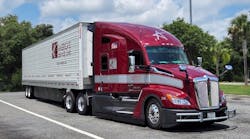It's been almost holy writ in the quick lube business that automotive/consumer-grade services and those meant for truck fleets be kept separate and distinct from one another. That philosophy, however, will be stood on its head this year by Mystik Lubricants as it rolls out a new type of "fast lube" service center designed to cater to both automobiles and commercial trucks – all under one roof.
"We're seeing a big decline in daily vehicle counts – reflective of the overall economic decline – aggravated by extended drain intervals, which allows both automobile and truck owners to delay oil changes," Dave Kunkel, sales & marketing manager for Mystik Lubricants, told FleetOwner.
"So our new Mystik Service Centers are designed to change the 'fast lube' paradigm by integrating automotive and commercial services – primarily to counteract those declining vehicle counts, but also to allow us to better serve fleets that operate a wide mix of vehicles," he added.
Kunkel said Mystik – a division of Citgo – plans to have two prototypes of its new fast-lube centers up and running by the end of May, with 10 to 12 locations in operation by the end of 2009. The key to making such a concept work hinges on two things, he explained – dedicated lanes for trucks and the use of its Internet-based oil analysis service, called LubeAlert, which can allow fleets to maintain an easily accessible vehicle maintenance history for services performed outside their own shops.
LubeAlert's database maintains oil analysis history on most makes and models of diesels in service today, Kunkel said, and that historical trend data can project potential wear and tear on different types of engines. Its data points also help fleets stay within recommended scheduled maintenance guidelines, with abnormal outcomes reports helping identify potential equipment failures.
The critical metric, however, is going to be the time savings the new service centers can offer fleets in terms of oil changes and light PM work vs. in combination with that data-capture feature, Kunkel believes. In his view, traditional truckstop maintenance facilities can take up to four hours to perform oil change services, while many dealerships can take days depending on their workload. But ystik's new centers are designed to handle routine truck oil changes within two hours.
"Fleets will tell you trucks don't make money sitting in a shop," he said. "What we're trying to do is offer them a fast way of getting the oil changes and light PM work done so their shops can focus on warranty work or more labor-intensive items such as engine rebuilds – all while maintaining a maintenance history for their vehicles while it's outside the shop."




